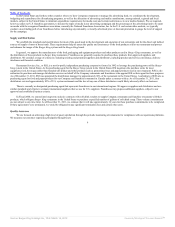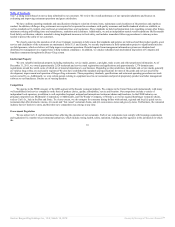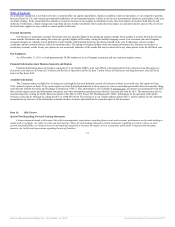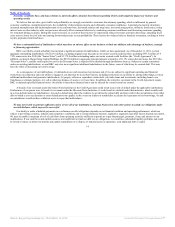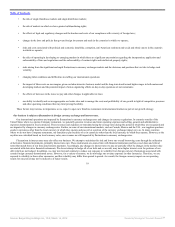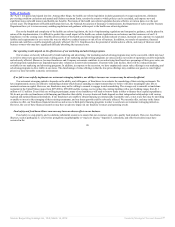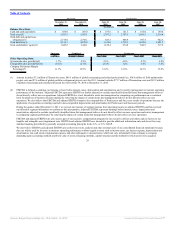Burger King 2011 Annual Report Download - page 20
Download and view the complete annual report
Please find page 20 of the 2011 Burger King annual report below. You can navigate through the pages in the report by either clicking on the pages listed below, or by using the keyword search tool below to find specific information within the annual report.
Table of Contents
As a result of entering into these hedging contracts with major financial institutions, we may be subject to counterparty nonperformance risk. Should there
be a counterparty default, we could be exposed to the net losses on the hedged arrangements or be unable to recover anticipated net gains from the transactions.
Increases in the cost of food, paper products and energy could harm our profitability and operating results.
Our profitability depends in part on our ability to anticipate and react to changes in food and supply costs. Any increase in food prices, especially those of
beef or chicken, could adversely affect our operating results. The market for beef and chicken is particularly volatile and is subject to significant price
fluctuations due to seasonal shifts, climate conditions, demand for corn (a key ingredient of cattle and chicken feed), ethanol policy, industry demand,
international commodity markets, food safety concerns, product recalls, government regulation and other factors, all of which are beyond our control and, in
many instances unpredictable. If the price of beef, chicken or other products that we use in our restaurants increases in the future and we choose not to pass, or
cannot pass, these increases on to our guests, our operating margins would decrease. In recent fiscal quarters, a rise in the price of beef has negatively impacted
our restaurant margins and we expect these elevated price levels to persist into fiscal year 2012.
Our exposure to risks from increases in food and supply costs may be greater than that of some of our competitors as we do not have ultimate control over
the purchasing of these products in the United States or Canada. In the United States, we have established a cooperative with our franchisees to negotiate food
prices on behalf of all Company and franchise restaurants. This cooperative does not utilize commodity option or future contracts to hedge commodity prices for
beef or other food products and does not typically enter into long-term pricing arrangements. Furthermore, we do not hedge commodity prices in markets outside
the United States. As a result, we typically purchase beef and many other commodities at market prices, which fluctuate on a daily basis. Increases in commodity
prices could result in higher restaurant operating costs, and the highly competitive nature of our industry may limit our ability to pass increased costs on to our
guests.
Increases in energy costs for our Company restaurants, principally electricity for lighting restaurants and natural gas for our broilers, could adversely affect
our operating margins and our financial results if we choose not to pass, or cannot pass, these increased costs to our guests. In addition, our distributors purchase
gasoline needed to transport food and other supplies to us. Any significant increases in energy costs could result in the imposition of fuel surcharges by our
distributors that could adversely affect our operating margins and financial results if we chose not to pass, or cannot pass, these increased costs to our guests.
Increases in labor costs could slow our growth or harm our business.
We are an extremely labor intensive business. Consequently, our success depends in part upon our ability to manage our labor costs and its impact on our
margins. We currently seek to minimize the long-term trend toward higher wages in both mature and developing markets through increases in labor efficiencies,
however we may not be successful.
Furthermore, we must continue to attract, motivate and retain regional operational and restaurant general managers with the qualifications to succeed in
our industry and the motivation to apply our core service philosophy. If we are unable to continue to recruit and retain sufficiently qualified managers or to
motivate our employees to sustain high service levels, our business and our growth could be adversely affected. Despite current economic conditions, attracting
and retaining qualified managers and employees remains challenging and our inability to meet these challenges could require us to pay higher wages and/or
additional costs associated with high turnover. In addition, increases in the minimum wage or labor regulations and the potential impact of union organizing
efforts in the countries in which we operate could increase our labor costs. Additional labor costs could adversely affect our margins.
In March 2010, comprehensive health care reform legislation under the Patient Protection and Affordable Care Act (HR 3590) and Health Care Education
and Affordability Reconciliation Act (HR 4872) (collectively,
19
Source: Burger King Holdings Inc, 10-K, March 14, 2012 Powered by Morningstar® Document Research℠


